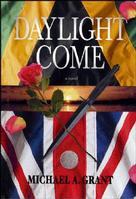
Daylight Come
Author: Michael A. Grant
Reviewer: Mel Cooke
Publisher: Great House Publishing
MICHAEL A. Grant's debut novel, Daylight Come, is a good book a very ambitious and detailed first novel in which actual events and personalities in Jamaica of the 1940s, World War II and the cusp of the island's Indepen-dence form the canvas for a sweeping, colourful tale of daring, dalliance, drink, death and, near the very end, an elusive daylight .
Unfortunately, however, Grant tries to do too much with the dialogue, weakening the tale by having his characters, especially the main one Pico Campbell, pour unnatural philosophy into ordinary conversation over and over and over again.
ARTIFICIAL DIALOGUE
The dialogue in Daylight Come moves with the plot but, man, is it stiff.
It is not inane, but just the opposite overly insightful and artificially so, as we simply do not try to imbue every line with pearls of wisdom and wonderful displays of deep thought.
The first look at the main character in Daylight Come sees a mature (at least in age) and cured (rum wise) Pico Campbell going on a bus from Port Antonio to Kingston for his yearly ritual of buying a pair of shoes.
He ends up at the airport seeing the Rastafarians excited over the 1966 arrival of Haile Selassie. From there, Daylight Come takes us back to the young adult days of a track star and 'gallis', who yearns for action - real action - in World War 2 and gets it, his incredible, trained memory saving the day in a wonderful moment when all seemed lost.
All is lost, however, as he is sworn to secrecy on pain of death and the pain of being unrecognised for his efforts that turned the war around drive him out of his mind.
Experiencing racism as he loses the only evidence of his heroics, a pair of hand-crafted shoes that go overboard as he is put in his place by a soldier, does not improve things and Grant crafts a good scene as a wet Pico (he went after the shoes) sees mirroring his true status through a glass.
Daylight comes for Pico Campbell after he has lost the love of his life to drink and he dies in the Bellevue Hospital.
CUTTING IRONY
And the cutting, final irony is that the longed-for recognition was finally within his grasp, as just before he died he got a receipt to collect a package which he dismissed out of hand, a package containing a medal that would have given proof to what had begun to be dismissed as drunken lies at Sonia's Bar and Grill in Port Antonio and given redemption to a broken disillusioned man.
All well and good, submarine journey, turning point of a foot race with a braggart, relatively brief moment of war action, first lovemaking scene with Elena who could have been his and all.
It struck me as odd by page 15 that Campbell, in the middle of a bus run-in with a market lady, would shout "I sacrificed to make all of you safe, you know, now you can all vote and talk loud anytime you want", but I passed it off and kept on.
By the time he is at a gathering with his British handler Thomas Atkins and, asked if he knows where he is, replies "..I get the feeling that this kind of group here, with no women around, is the typical thing you might see when big politics and big money come together" I was concerned.
ANNOYING
All well and good, this keen insight and philosophising, in small chunks, but having it constantly thrown at you, line after line, paragraph after paragraph from all angles of characters is unnatural and annoying.
EFFORT WORTH IT
The use of 'rapping' for 'wrapping' in one instance and a few missing open quotation marks did not help either.
It is a credit to the strength of Daylight Come that I ploughed on and the effort was worth it.
Daylight Come runs 337 pages and is published by Great House Publishing (which is a tradename of Michael A. Grant).

